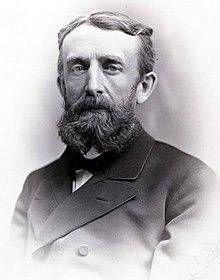The historical conflict thesis
John William Draper
Andrew Dickson White
In the 1800s the relationship between science and religion became an actual formal topic of discourse, while before this no one had pitted science against religion or vice versa, though occasional interactions were expressed in the past.[6] More specifically, it was around the mid-1800s that discussion of “science and religion” first emerged because before this time, “science” still included moral and metaphysical dimensions, was not inherently linked to the scientific method, and the term “scientist” did not emerge until 1834.[7] The scientist John William Draper and the writer Andrew Dickson White were the most influential exponents of the conflict thesis between religion and science. Draper had been the speaker in the British Association meeting of 1860 which led to the famous confrontation between Bishop Wilberforce and Huxley over Darwinism, and in America “the religious controversy over biological evolution reached its most critical stages in the late 1870s”.[8] In the early 1870s Draper was invited by American science popularizer Edward Livingston Youmans to write a History of the Conflict between Religion and Science (1874), a book replying to contemporary issues in Roman Catholicism, such as the doctrine of papal infallibility, and mostly criticizing what he claimed to be anti-intellectualism in the Catholic tradition,[9] but also making criticisms of Islam and of Protestantism.[10] Draper’s preface summarises the conflict thesis:
The history of Science is not a mere record of isolated discoveries; it is a narrative of the conflict of two contending powers, the expansive force of the human intellect on one side, and the compression arising from traditionary faith and human interests on the other.[11]
In 1874 White published his thesis in Popular Science Monthly and in book form as The Warfare of Science:
In all modern history, interference with science in the supposed interest of religion, no matter how conscientious such interference may have been, has resulted in the direst evils both to religion and to science—and invariably. And, on the other hand, all untrammeled scientific investigation, no matter how dangerous to religion some of its stages may have seemed, for the time, to be, has invariably resulted in the highest good of religion and of science.[12]
Biologist Stephen Jay Gould said: “White’s and Draper’s accounts of the actual interaction between science and religion in Western history do not differ greatly. Both tell a tale of bright progress continually sparked by science. And both develop and use the same myths to support their narrative, the flat-earth legend prominently among them”.[18] In a summary of the historiography of the conflict thesis, Colin A. Russell, the former President of Christians in Science, said that “Draper takes such liberty with history, perpetuating legends as fact that he is rightly avoided today in serious historical study. The same is nearly as true of White, though his prominent apparatus of prolific footnotes may create a misleading impression of meticulous scholarship”.
James Joseph Walsh, M.D., the historian of medicine, criticized White’s perspective as anti-historical in The Popes and Science; the History of the Papal Relations to Science During the Middle Ages and Down to Our Own Time (1908),[13] a book dedicated to Pope Pius X:
the story of the supposed opposition of the Church and the Popes and the ecclesiastical authorities to science in any of its branches, is founded entirely on mistaken notions. Most of it is quite imaginary. Much of it is due to the exaggeration of the significance of the Galileo incident. Only those who know nothing about the history of medicine and of science continue to harbor it. That Dr. White’s book, contradicted as it is so directly by all serious histories of medicine and of science, should have been read by so many thousands in this country, and should have been taken seriously by educated men, physicians, teachers, and even professors of science who want to know the history of their own sciences, only shows how easily even supposedly educated men may be led to follow their prejudices rather than their mental faculties, and emphasizes the fact that the tradition that there is no good that can possibly come out of the Nazareth of the times before the reformation, still dominates the intellects of many educated people who think that they are far from prejudice and have minds perfectly open to conviction



Leave a comment